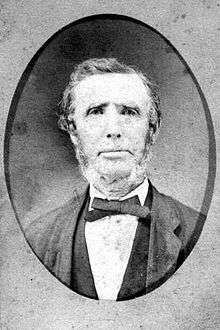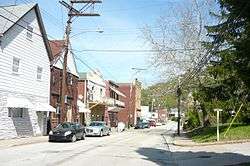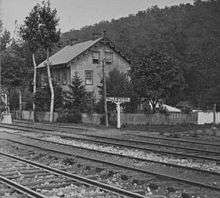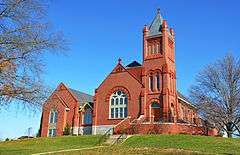Frank Wall (steamboat engineer)
| Frank Wall | |
|---|---|
 | |
| Born |
January 4, 1810 County Londonderry, Ireland |
| Died |
July 3, 1896 (aged 86) Pittsburgh, Pennsylvania |
| Occupation | Steamboat engineer |
| Known for | Founder of Wall, Pennsylvania |
| Religion | Roman Catholic |
| Spouse(s) | Catherine Agnes Kelly |
| Children |
Anna Margaret Wall Isabell V. "Bell" Wall Frances "Fannie" Elizabeth Wall Michael Louis Wall Mary Charlotte "Lottie" Wall Simms Francis Xavier Wall, Jr. Katherine "Kate" Wall Kuhn John Kelly Walls |
Francis Xavier "Frank" Wall (January 4, 1810 – July 3, 1896) was a steamboat engineer and millionaire considered the founder of the town of Wall, Pennsylvania.[1]
Early years in Ireland
Francis Xavier Wall was born on January 4, 1810 in County Londonderry in modern-day Northern Ireland to Michael Walls and Margaret McKee.[2]
Emigration
He emigrated to America with his mother in 1822.[3] His father went in 1810.[2] He early left his father's home near Pittsburgh and worked on railroads and on the Pennsylvania Canal.[3] His first job at the age of 18 was as a teamster for the Pennsylvania Railroad Company.[2]
Steamboat engineer
He had a natural inclination for mechanics and turned his efforts to engine making until obtaining a position as an engineer on steamboats on the Mississippi River.[3] He would go from Pittsburgh to New Orleans including the Gulf of Mexico.[4] He served in this capacity seventeen or eighteen years.[3] He also traversed the Chattahoochee and Indian Rivers of Georgia during the Seminole Wars.[2]
Marriage
Wall was married to Catherine Agnes Kelly of Columbus, Georgia about 1846.[4][5] Her family came from Dungannon in County Tyrone.
Wall, Pennsylvania
Eponymous city

Wall is located at the site of a farm purchased by James Walls in 1829. The property, on the south bank of Turtle Creek,[6] was passed to James' sons Henry and John Walls, who lived in a log cabin near the heart of present-day Wall. A station on the Pennsylvania Railroad opened in the early 1840s, which was named "Walls' Station" in honor of the Walls family.[7] Eventually, the name of the station and the town that grew up around it was shortened to "Wall Station". Henry and John Walls sold their property to their cousin Frank, who developed the property around the station.[8] The town then shortened to Wall after Frank,[9] whose property development led to him being the owner of the first two houses erected in the region.[10][11]
Return to Pennsylvania
He returned around 1847 to Wall to farm when not much later his father died.[2] On his return he had purchased a two hundred and fifty acre farm adjoining his father's for the consideration of $4,900.[5] This farm also abutted the right of way of the main line of the Pennsylvania Railroad which purchased five to ten acres until purchasing the remaining bottom lands in the late 1860s for $40,000.[5] One calculation put his profits in excess of $180,000.[5]

A station was named for him just outside of Pittsburgh.[12] One source reads "Wall's station is a depot for wood and water of the second class."[13] Another reads, it "is the limit for the local accommodation trains from Pittsburg."[14]
Springfield, Kentucky
The selling of the farm to the Pennsylvania Railroad making him quite wealthy;[15] he went to Springfield, Kentucky. After apparently spending some time at the home of his wife in Columbus,[5] he took the train to Louisville and from there walked appraising the countryside until some 50 miles later arriving at Springfield. There he attended the auction of a farm for sale, paying in cash taken from under his hat.[5] In Springfield he owned racehorses.[16]
Death

On July 3, 1896, Wall, came to Pittsburgh from his home in Springfield, Kentucky to close up a real estate transaction with the Pennsylvania Railroad Company involving about $30,000.[17] He also came to visit relatives.[18] Arriving at the station which bore his name, Wall, who was hard of hearing, had just started to walk along the track when he was hit by another railroad train and crushed to death in sight of many onlookers.[17][18] He was a millionaire at the time of his death.[17][18][19] Many knew him as "Uncle Frank."[3] He is buried at Saint Dominics Cemetery in Springfield, Kentucky with a large angel atop his gravestone.
Will
He left an extensive will.[20] To his son Michael, he left a farm known as the Powell farm of 240 acres; $4500 stock in the Peoples Deposit Bank and a Washington County bond of $1,000. To his son John he left the Yates farm in Washington county covering 225 acres and $1,000 Washington County bond. To his daughter "Lottie" Simms he left the Walls home place containing 230 acres. To Kate Wall Kuhn, he left 55 acres of land in Jefferson County, adjoining the city of Louisville. To miss Fannie Wall he gave all of his real estate in Columbus, Georgia and $4,000 in cash. To Bell Wall he left property in Springfield known as the Central Hotel property and $2,000 in cash. To Frank Wall, Jr he left all of his lots at Spring Hill, near Wall. He divided the property at Wall alike amongst all the children. The executors of the will were Frank Wall Jr and two sons-in law, Ben F. Simms and Ferdinand E. Kuhn.
Personal
Frank Wall is the great-great grandfather of former New York Giants quarterback Phil Simms.
References
- ↑ "[No title]". Semi-weekly interior journal. July 7, 1896. Retrieved April 19, 2015 – via Chronicling America.

- 1 2 3 4 5 "Frank Wall". News-Leader Illustrated Supplement. p. 2. Retrieved April 20, 2015 – via Kentuckiana Digital Library.

- 1 2 3 4 5 "The Late Frank Wall". News-Leader. July 9, 1896. p. 2. Retrieved April 19, 2015 – via Kentuckiana Digital Library.

- 1 2 "Death of Mrs. Wall". News-leader. August 18, 1904. Retrieved April 20, 2015 – via Kentuckiana Digital Library.
- 1 2 3 4 5 6 Frank K. Wall's letter to Mary Denis Kuhn, dated March 17, 1964
- ↑ Schmeichel, Susan K. "Town rooted in history to mark 100".
- ↑ "Our towns: Wall".
- ↑ Jr, Frank J. Kordalski; Kordalski, Michael R. (24 August 2015). "Old Versailles Township". Arcadia Publishing – via Google Books.
- ↑ REPORT-ETHNOGRAPHIC SURVEY-TURTLE CREEK VALLEY
- ↑ Cushing, Thomas. A Genealogical and Biographical History of Allegheny County, Pennsylvania. Baltimore: Genealogical Pub., 1975; p. 505
- ↑ "Frank Wall Has A Few Words To Say About The Value Of Poor Farm Land". Pittsburg Dispatch. December 8, 1891. p. 2. Retrieved April 19, 2015 – via Chronicling America.

- ↑ "Pittsburgh-Its Railroads and Manufactures". Railway World: 317. April 2, 1892.
- ↑ Guide for the Pennsylvania railroad, with an extensive map : including the entire route, with all its windings, objects of interest, and information useful to the traveler. p. 31.
- ↑ William B. Sipes (1875). The Pennsylvania railroad : its origin, construction, condition, and connections ; embracing historical, descriptive, and statistical notices of cities, towns, villages, stations, industries, and objects of interest on its various lines in Pennsylvania and New Jersey. p. 161.
- ↑ "History of Wall Borough, Pennsylvania".
- ↑ e. g. The American Shorthorn Herd Book. 29. p. 140.
- 1 2 3 "Terrible Fate". Courier-Journal. July 4, 1896. Retrieved April 20, 2015 – via Newspapers.com.

- 1 2 3 "Frank Wall Killed". Pittsburgh Commercial Gazette. July 4, 1896. p. 2. Retrieved April 19, 2015 – via Newspapers.com.

- ↑ "Aged Kentuckian". July 8, 1896. Retrieved April 19, 2015 – via Chronicling America.

- ↑ "Gossip". News-leader. July 30, 1896. Retrieved April 19, 2015 – via Kentuckiana Digital Archive.
